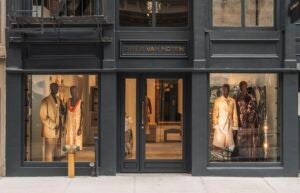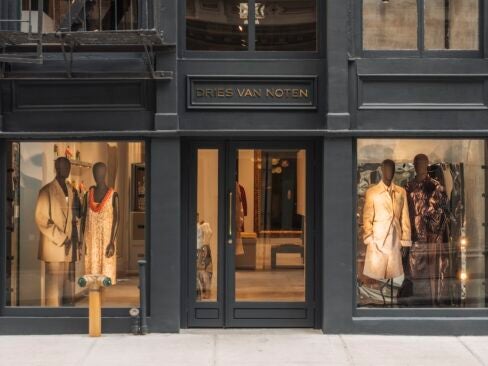
Co-President & Vice President of Marketing and Creative Services Mitchells Family of Stores
While the big high fashion brands continue their global march with a never-ending string of their own mono-brand temples, Mitchells Family of Stores is looking ahead to its fourth generation. The group started in Westport, Conn., “with three men’s suits, a coffee pot and a dream.” In 1995, the family bought Richards of Greenwich, then in 2005 acquired Marshs of Huntington, Long Island. In 2009 while the industry was reeling from the recession, the family made a bold cross-country move adding Wilkes Bashford stores in San Francisco and Palo Alto. Its formula: Using the personal touch, management discipline not always found in a family businesses, opportunistic expansion, some ads in local high school football programs and a 24-hour Fashion Emergency hotline. Recently, Co-President Bob Mitchell and Vice President of Marketing and Creative Services Andrew T. Mitchell-Namdar joined Elite Traveler Editor-in-Chief Douglas Gollan at Patroon in New York City for a wide ranging that covered renovations, succession planning and even a trip to Fantasy Island.
(Left: Andrew; Right: Bob)
ET: What makes the Mitchells Family of Stores different from other shopping experiences?
Bob Mitchell: Our relationships—we create a unique shopping experience. The finest product, a good selection and the real difference we think is the relationships.
ET: Can you give some specific examples?
Bob Mitchell: First of all the average tenure of our sales staff is over 15 years. Every salesperson has the mindset of a personal shopper.
Andrew T. Mitchell-Namdar: We do Closet Clears. We help people purge items. We help them mix and match. For some customers we make photo books. For others we actually take what they don’t need anymore, tag it all and handle the donations for them. When people let you in their closet, that says something.
We have a 24/7 number for Fashion Emergencies. The calls go to one of our houses. One example was a Saturday night. A customer was leaving for a two-week business trip, his wife had taken all his suits to the dry cleaner and forgot to pick them up. We opened up the next morning—we are closed on Sundays—he came in and we got him suits for his trip, we did the alterations.
In another case we had a customer come in on his birthday and picked up a bunch of suits. Our salesperson noticed it from our database but the customer was rushed, wanted to get in and out, so she tucked the birthday card in a suit pocket. A week later he was on a trip and got the card, and right away called.
Husbands love reminders. If we see someone’s wife in looking at specific shoes and we see its her birthday coming up, we call her husband just to let him know what she was looking at it. Being able to surprise her with something she really wants is priceless.
We try to be like your favorite restaurant where the owner is always there and always comes over and says hello and sees how you’re doing.”
ET: Are there any other reasons your stores have been so successful?
Andrew T. Mitchell-Namdar: We believe as a specialty store we have to be tied to the community. Every week in all of our stores we have some type of charity event. We make our conference room and our stores available to community groups for meetings. We do ads in the local football programs. Larger chain stores can’t do things like this. In one case, I was once talking to a large brand about a charity project we were working on. The person at the brand said, “we don’t do charity.” Right away, I thought ‘great’ because it just underscores how we are different from the big brands that have their own stores.
ET: Do you have many customers come from outside your local markets?
Bob Mitchell: In San Francisco 25 to 30 percent of our business is transient. In Greenwich we have a large group of customers who come down from Boston. One of largest customers isn’t even in our footprint. He’s in Philadelphia. We go to see him as much as he comes to us.
ET: Do you have a formal training program?
Bob Mitchell: (Our training) is not as structured as you would think. We hire for culture. Technical knowledge is less important. We can teach that. It’s not about the transaction.
ET: Considering the strength of your customer relationships, are there other businesses we could see you expand into?
Andrew T. Mitchell-Namdar: We have a strategic planning group. It’s like Fantasy Island. Should we have a spa, a restaurant, a super high-end florist? There is definitely room to grow. We also need more space just to expand our current business. We could definitely play in the kid’s business.
ET: How did you get from fashion into jewelry?
Bob Mitchell: Our customers were asking us, where do I go to buy diamond rings?
Andrew T. Mitchell-Namdar: Twenty-five percent of our women’s business is now jewelry and it’s growing at 30 percent per year. We think in diamonds we are just scratching the surface.
ET: Would bringing in outside investors or going public enable you to better tap into these type of opportunities?
Andrew T. Mitchell-Namdar: We’ve talked about it. We have very wealthy customers and customers who are in the banking business who talk to us about it. We cherish the idea of being a privately owned family business. It keeps us nimble and close to our customers.
ET: Is there interest yet from the next generation?
Andrew T. Mitchell-Namdar: The oldest member of the fourth generation is turning 17. We are starting to talk about the set of rules for the next generation entering the business. Should we require an MBA? For my generation, it had to be five years working outside the business, experience directly related to the business, there had to be an opening or a need. For me it took three years from when I wanted to come in the business until there was an opening.
ET: Do you have any ways to benchmark your business?
Andrew T. Mitchell-Namdar: We are part of the International Menswear Group, which includes leading specialty retailers from Switzerland, Holland, Australia, Germany, a total of 11 countries. It’s a group of noncompetitive specialty stores. We review and share with each other every detail from marketing to financials. It really enables us to benchmark. There are three days of structured board meetings and there are three days of social. We cover things from succession planning to vendor relations to recruiting. We are also part of a North American group the Forum shops, we produce a magazine together for customers and have even developed private label merchandise. We get different things out of different groups.
ET: When did you start thinking about a West Coast footprint?
Bob Mitchell: 15 years ago in the men’s business, Wilkes Bashford was the premium purveyor. Growing up we aspired to be like Wilkes Bashford. It was a unique opportunity because of the downturn. It was a pre-packaged bankruptcy, and we got the stores in San Francisco and Palo Alto. The first year was getting the house in order. This gives us a national footprint.
ET: Can you describe how the Wilkes Bashford San Francisco location will look after the renovation?
Bob Mitchell: It’s a townhouse and we wanted to keep that feel. We’ve opened up windows to bring in natural light. In the Penthouse there is a bar and a fireplace and throughout there are plenty of seating areas. We are going from five sales floors to seven. Each floor has 3,000 square feet. There will be three men’s floors and three women’s floors and one shared floor on the ground. At the first of the year we opened the Penthouse featuring Kiton and Brioni. In the next 60 days we will open the other two men’s floors and by the end of October the other three floors will be ready.
ET: Did you have any concerns about adding a new business, in a recession, on the opposite coast?
Andrew T. Mitchell-Namdar: Most people look at financials. We went out and spent the first week meeting every seller, every buyer, everyone who worked there to understand the culture. We spent as much time digesting the culture as looking at the financials. If the culture hadn’t been a fit, it wouldn’t have made sense.
ET: As a privately held family business, any lessons from the recession?
Bob Mitchell: The most important look back lesson is that debt was a four-letter word. Our ability to stay true to who were was in part that we didn’t have a lot of debt. We had to resize but we kept the highest possible service. Our number one measure was ‘were people happy’ when they left the store.
ET: Any specific ways you have been successful taking the family business from one generation to the next?
Andrew T. Mitchell-Namdar: We work with a family business consultant. We have nine family members in the business. We have a family council that meets quarterly and two-day retreats. This includes spouses and children 14 years old. We have a long history of not believing in debt. We have an Advisory Board. They don’t have a fiduciary responsibility but they have an amazing amount of knowledge and interest in our business. One was head of technology at IBM, another is an attorney. In the case of Wilkes Bashford opportunity we were able to call on them for advice. We compensate them because when it comes to advice you get what you pay for. Several of them knew our grandfather. They come to our weddings.
ET: How about in terms of roles of family members in the business?
Andrew T. Mitchell-Namdar: One of the pieces of the third generation was each of the roles of the family members had to be clearly defined. If it was gray, it could lead to tension. We have very straight and rigid responsibilities. You can have an opinion on everything, but I can’t make another family member change what they are doing.















